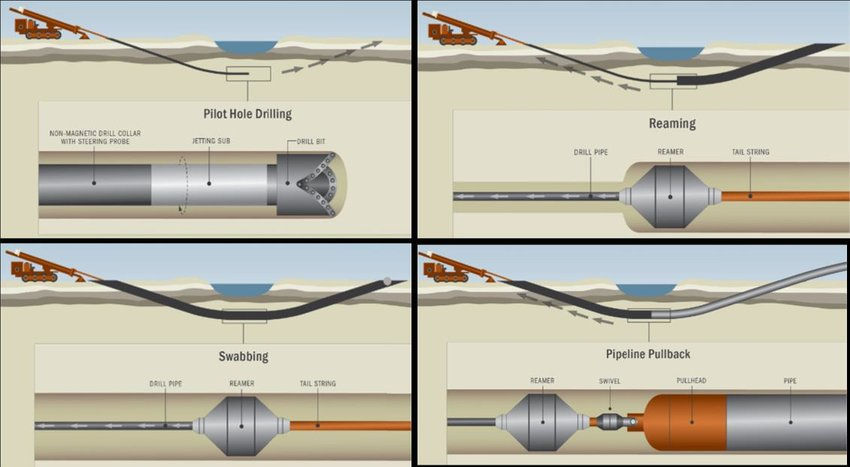Why Is Safety a Top Priority in Underground Boring Projects?
- Grid Tech
- Dec 5, 2023
- 3 min read
When it comes to underground boring services, safety should always be the top priority. The subterranean world of construction and utility installation can be fraught with potential dangers, making it crucial to implement rigorous safety measures. In this blog post, we will delve into the importance of safety in underground boring projects, highlighting the reasons why it should never be compromised.

Underground Boring Services: A Brief Overview
Before we dive into the reasons why safety is paramount in underground boring projects, let's take a moment to understand what these services entail. Underground boring, also known as horizontal directional drilling (HDD), is a trenchless method used for installing pipelines, cables, and other utilities beneath the surface without the need for extensive excavation. It is a versatile and efficient technique, but it is not without its risks.
Protecting Workers and Operators:
Safety in underground boring projects begins with safeguarding the individuals involved. Boring operators, laborers, and technicians are exposed to various hazards, including heavy machinery, high-pressure fluids, and the unpredictability of subsurface conditions. Proper training and protective gear are essential to ensure their well-being.
Preventing Environmental Damage:
One of the key benefits of underground boring is its minimal impact on the environment compared to traditional trenching methods. However, this doesn't mean there is no environmental risk involved. Accidental fluid spills or breaches in containment can lead to soil and water contamination. Stringent safety protocols can mitigate these risks and protect the environment.
Avoiding Utility Interference:
Underground boring often takes place in areas where existing utilities like gas lines, water pipes, and electrical cables are present. Accidental damage to these utilities can have catastrophic consequences. Safety measures such as advanced mapping, utility locating, and careful drilling techniques are essential to prevent utility interference.
Ensuring Project Integrity:
The success of an underground boring project depends on the structural integrity of the installed utility lines. Any damage or compromise during the installation process can lead to costly repairs and service disruptions. Prioritizing safety means ensuring that the project is executed with precision and attention to detail.
Regulatory Compliance:
Government regulations and industry standards mandate strict safety guidelines for underground boring projects. Non-compliance can result in legal repercussions and fines. Adhering to these regulations is not just a legal obligation but also a moral responsibility.

Mitigating Financial Risks:
Safety incidents have the potential to inflict crippling financial consequences on projects and companies. These liabilities encompass a spectrum, spanning medical expenses, legal fees, insurance claims, and reputation damage. Prioritizing safety becomes not just a moral duty but a strategic financial decision. By actively emphasizing safety measures, underground boring companies can effectively mitigate these financial risks, ensuring the sustainability and success of their operations while protecting their bottom line.
Enhancing Reputation:
A proven history of safety excellence serves as a compelling marketing asset for underground boring firms. Clients are increasingly inclined to select contractors renowned for their commitment to safety because it instills confidence that their projects will be executed smoothly and without mishaps. This reputation for safety not only secures contracts but also fosters long-term client relationships, positioning safety-conscious companies as industry leaders and trusted partners in the eyes of their clientele.
Encouraging Innovation:
Safety concerns act as catalysts for innovation in underground boring technology. As companies are driven to enhance safety measures, they invariably pioneer novel tools and techniques, thereby advancing the entire industry. These innovations don't just ensure safer working conditions but also lead to more efficient and cost-effective underground boring services. In essence, prioritizing safety is a pathway to continual progress and improved operations in this specialized field.
Promoting a Culture of Safety:
Safety should transcend mere rules and regulations; it should be woven into the very fabric of an organization's identity. When a company fosters a culture of safety, where every employee and contractor inherently values and prioritizes safety in their daily actions, the likelihood of accidents occurring diminishes substantially. This cultural commitment to safety ensures that vigilance and precaution become second nature, safeguarding lives, assets, and reputations.
Fostering Accountability:
In underground boring projects, multiple parties are often involved, including contractors, engineers, and utility companies. Establishing clear lines of accountability for safety ensures that everyone understands their role in maintaining a safe work environment.

Concluding Thoughts
In the world of underground boring services , safety is not just a checkbox on a list of requirements; it is a fundamental principle that should guide every aspect of a project. From protecting the well-being of workers to preventing environmental damage, ensuring safety is the responsibility of every stakeholder.
Prioritizing safety is not only a moral obligation but also a smart business decision. It reduces the risk of costly accidents, enhances a company's reputation, and drives innovation in the industry. Safety isn't an option; it's a necessity.
So, the next time you consider an underground boring project, remember that it's not just about getting the job done—it's about getting it done safely. In the subterranean world, where unseen dangers lurk beneath the surface, safety should always be the top priority.


Comments